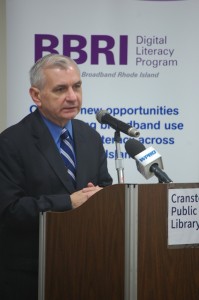Reed Adds Library Amendment to Immigration Bill
Sen. Jack Reed (D-RI) is offering a library amendment to the immigration bill that the Senate is considering this week. The amendment, #1223, would make public libraries eligible for funding for English language instruction and civics education, and would also add Susan Hildreth, the director of the Institute of Museum and Library Services (IMLS) to the Task Force on New Americans. The American Library Association (ALA) is asking its members to call their Senators in support of Reed’s amendment.
According to the Congressional Record, Reed said that the amendment “recognizes the longstanding role that libraries have played in helping new Americans learn English, American
civics, and integrate into our local communities. It ensures that they continue to have a voice in these critical efforts… This amendment expands on the recent partnership between U.S. Citizenship and Immigration Services (USCIS) and IMLS.” He also cited IMLS statistics which say that more than 55 percent of new Americans use a public library at least once a week.
The bill itself, the Border Security, Economic Opportunity, and Immigration Modernization Act, seeks to strike a balance between creating a path to citizenship for undocumented immigrants and addressing concerns about border protection. It does so in part by tying the authority to confer new, more protected statuses on undocumented immigrants to the creation and implementation of stringent border controls. These include registered provisional immigrant (RPI) status, and the subsequent conversion of such registered provisional immigrants to lawful permanent resident status.
Among the criteria for RPI status are English language skills, which makes Reed’s amendment particularly relevant.
Originally introduced by Senator Charles Schumer (D-NY), the bill has seven co-sponsors—four Republicans, three Democrats—including two from the border state of Arizona. (That co-sponsors number may soon fall to six; Senator Marco Rubio [R-FL] said he would withdraw his support for the bill if an amendment which would give equal protection to opposite-sex spouses were added.) In spite of its bipartisan support, GovTrack gives the bill as a whole only a 27 percent chance of being enacted.
Reed Backs Workforce Investment in Libraries Too

Senator Reed speaks about workforce investment at a Rhode Island library
Reed is a staunch supporter of libraries’ role in achieving civic goals. He also recently introduced, with Senator Thad Cochran (R-MS), the Workforce Investments through Local Libraries Act (WILL) Act, which would recognize public libraries as allowable “One-Stop” partners, add library representation on workforce investment boards, and authorize new demonstration and pilot projects to establish employment resources in public libraries.
Reed spoke about the need for WILL at an event at the Cranston Public Library’s Central branch on June 14, along with Rhode Island Department of Labor and Training (DLT) Director Charles J. Fogarty, Rhode Island Office of Library and Information Services (OLIS) Chief Library Officer Howard Boksenbaum, and Cranston Public Library Director Edward Garcia.
“The WILL Act strengthens the connection between our public libraries and the ‘One-Stop’ system to better serve job seekers with more targeted services,” said Reed. “The WILL Act would give library users better access to workforce activities and information related to training and employment opportunities, including resume development and job bank searches,” said Reed. “We need to maximize our resources and draw upon the strength of community assets like public libraries to ensure our workforce development efforts are effective and efficient.” According to the Institute of Museum and Library Services, 30 million Americans used a library computer to address their career and employment needs in 2009. Sadly, GovTrack gives WILL a zero percent chance of being enacted.
![]()
![]()
![]()
![]()
![]()
![]()
![]()
![]()
RELATED
The job outlook in 2030: Librarians will be in demand
The job outlook in 2030: Librarians will be in demand
ALREADY A SUBSCRIBER? LOG IN
We are currently offering this content for free. Sign up now to activate your personal profile, where you can save articles for future viewing





Add Comment :-
Be the first reader to comment.
Comment Policy:
Comment should not be empty !!!